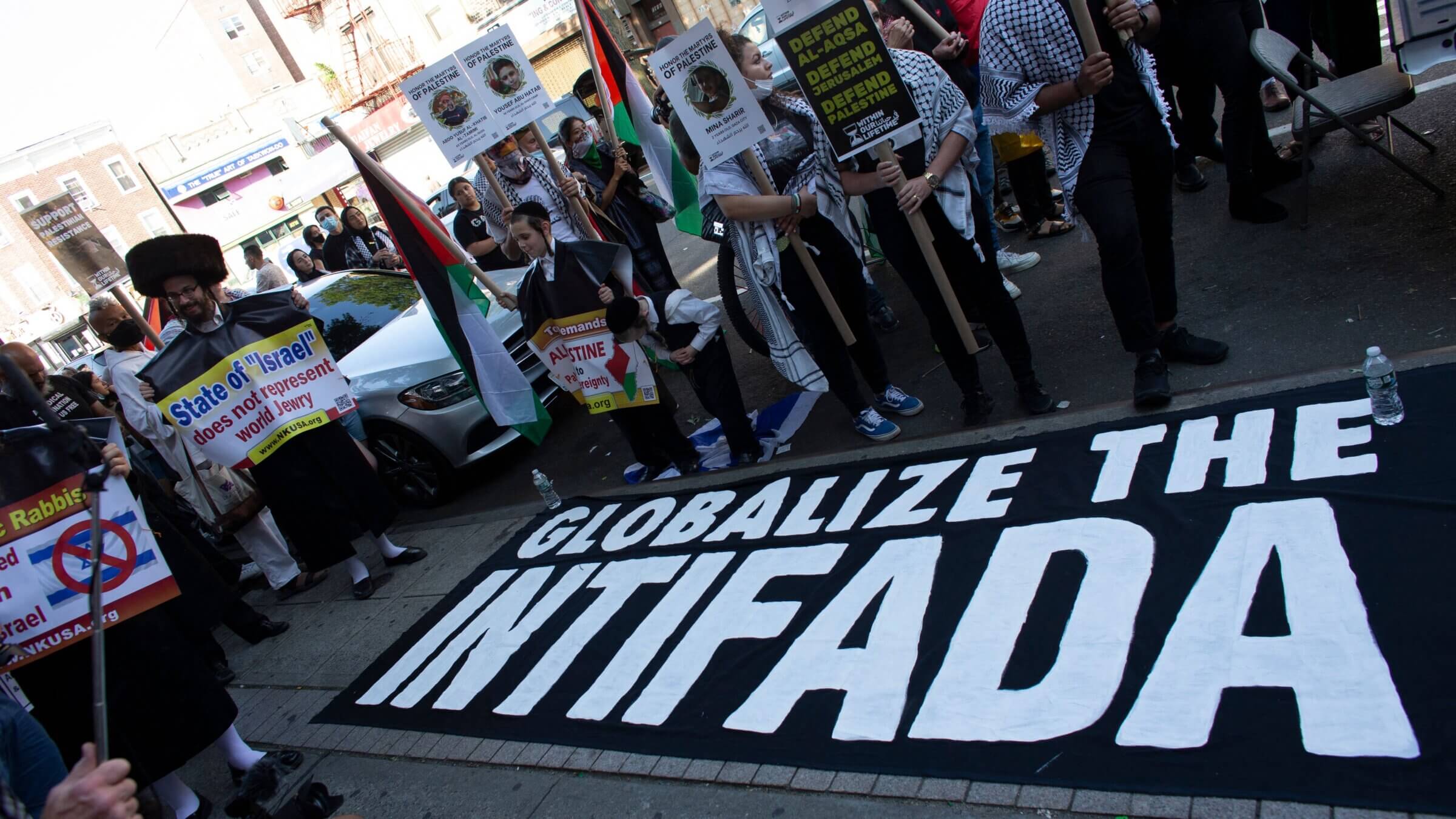So what does ‘intifada’ actually mean?
Rep. Elise Stefanik equated ‘intifada’ with a call for genocide against Jews. So what does intifada really mean?

A sign reading “Globalize The Intifada” as people demonstrate in 2021. Courtesy of Getty Images
Let’s explore the meaning of intifada
On college campuses and city streets, the word intifada has become central to pro-Palestinian protests. Signs proclaim “globalize the intifada” and demonstrators often chant “one solution: intifada, revolution” or “long live the intifada” as they march.
Some see this as an open call for violence against Jews — recently in Congress, Rep. Elise Stefanik framed it as a call for Jewish genocide. But others say it is a peaceful term, calling for a nonviolent uprising against Israel’s occupation of the West Bank and blockade on the Gaza Strip.
The dispute comes from the difference between the word’s literal meaning in Arabic and its usage historically, and outside of its Arabic roots.
Arabic contains many words for revolts or uprisings, each with a different valence — and often understood differently in the West, and when used in English in ways that don’t capture the words’ full meaning.
“The word jihad is really abused in the West. People think when you use the word jihad, right away: holy war,” said Mohammed Sawaie, an Arabic professor at the University of Virginia. “The sense of the word really means: struggle.”
He explained that there are two senses of the word in Arabic tradition: a big jihad and a small jihad. The first is a religious war, but the latter, which is more common in everyday usage, is a personal struggle, such as an attempt to quit smoking.
Thawra, meanwhile, is a total revolutionary change that implies not only a new government, but also a change in education, society and culture. And then there’s inqulab, a military coup.
Intifada connotes an uprising against an oppressor. But that’s a relatively new meaning for the word, which comes from a verb root meaning “to shake off” or “dust off.” It only acquired its revolutionary implications during the Iraqi Intifada in 1952, a series of strikes and riots protesting the monarchy at the time. In Arabic, Sawaie said, it is also used to talk about the Arab Spring, and other revolts against oppressive regimes.
But for many people today, the word intifada is inextricably tied to the First and Second Intifadas, Palestinian uprisings in the 1980s and early 2000s.
Daniel Lefkowitz, a professor of language and culture in the Middle East at the University of Virginia who lived in Israel for several years in the early 2000s, hypothesized that, for most Palestinians, the word brings up memories of the First Intifada, a largely non-violent Palestinian protest largely involving work stoppages, boycotts and demonstrations. Some Palestinians also attacked Israelis, mostly with small weapons such as rocks or Molotov cocktails, and on some occasions with firearms or grenades.
“The intifada, the shaking off, was a metaphor of effective claiming of a voice, presenting a situation to the world’s audience, but not engaging in the spectacular violence of the PLO, like plane hijacking,” he said. “So that was seen as a very progressive movement.”
“It was the David-Goliath representation — stones against machine guns,” he added.
But for Israelis, and many Jews, the word brings up memories, instead, of the Second Intifada, a far bloodier Palestinian uprising characterized by suicide bombings on buses and at cafés that killed about 1,000 Israeli civilians.
“So I think the same word quite reasonably calls up different meanings,” said Lefkowitz.
That means it’s impossible to say, definitively, if the word intifada is a call for violence or not — different people understand and use it differently, as is the case with so many words and symbols and, well, the entire narrative of the Israeli-Palestinian conflict. Israelis’ celebration of independence, Yom HaAtzmaut, is a day of national grief for Palestinians mourning the Nakba.
“Languages change, words change. And the changes are often by community, and often political community,” said Lefkowitz. “Words or phrases or labels or names change in their meaning, and often diverge in their meaning, often along the lines of communities that diverge.”
Some online have alleged that anyone suggesting that intifada is a violent term is attempting to obscure acts of Israeli violence against Palestinians. But that’s unlikely; many Jews and Israelis have real reasons to hear “globalize the intifada” as a threatening chant.
But it’s just as genuine to argue that calling for a global intifada is a peaceful slogan.
“It certainly strikes me as meaning, to Arabs or Arab-sympathetic people, a globalization of a non-violent or minimally violent resistance movement,” said Lefkowitz.
As for Stefanik’s charge in Congress, however, that calling for an intifada is equivalent with calling for genocide of Jews, not just violence, Lefkowitz sees less interpretational wiggle room.
“Intifada and genocide — to me that’s an unreasonable stretch,” he said. “I don’t think there’s any reasonable interpretation of intifada where it means genocide.”
















